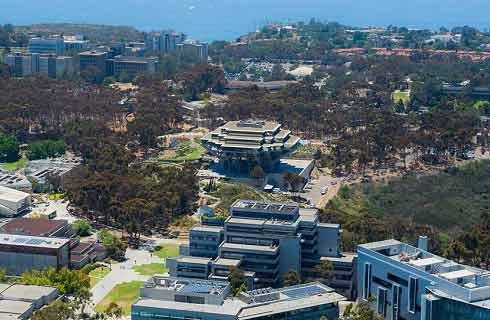工程技术学士学位(电气)
Bachelor of Engineering Technology (Electrical)

学历文凭
Bachelor Degree

专业院系
Centre for Engineering and Industrial Design

开学时间

课程时长

课程学费

国际学生入学条件
Candidates are required to have:
- obtained the New Zealand Diploma in Engineering (NZDE) with a 60% or better overall grade average or
- completed at least two years relevant work experience post-graduation; or
- gained admission approved by the Programme Committee/Centre Director; or
- completed equivalent academic qualifications which may include University Bursary with 45% or more in both Physics and Calculus or Algebra; equivalent Cambridge score, equivalent International Baccalaureate.
Candidates who have English as a second language are required to have an overall International English Language Test System (IELTS) score of 6.0 or better in the academic module, with a minimum of 6.0 in the written and speaking bands, and a minimum of 5.5 in the reading and listening bands, or
- TOEFL Internet-based test (iBT) score of 60 (with a writing score of 18)
- TOEFL Paper-based Test (pBT) score of 550 (with an essay score of 5 TWE)
- Pearson Test of English (Academic) score of 50 with no band score lower than 42
IDP—雅思考试联合主办方

雅思考试总分
6.0
- 雅思总分:6
- 托福网考总分:60
- 托福笔试总分:160
- 其他语言考试:PTE Academic requirement - PTE (Academic) score of 50 with no band score lower than 42
CRICOS代码: WK2611
申请截止日期: 请与IDP联系 以获取详细信息。
课程简介
Asanelectricalengineeringtechnologist,aworkdaycouldinvolvespecifying,designing,orsupervisingtheconstructionofsystemsandequipmentthatproduce,distribute,oruseelectricity,calculatingcostsandmaterialsneeded,biddingforcontracts,overseeingelectricitysystemtests,andwritingreportsoreveninstructionmanuals.Electricalengineeringincludesthespecialistareaofmechatronics,whichmergesthetwodisciplinesofmechanicalengineeringandpowerengineeringforin-depthknowledgeofthefundamentalcomponentsofpowerautomatedsystems.Thisprogrammeisforthosewhowantacareerinengineering.Studentswilllearntheoryandhands-onpracticalskillsusingmoderntechnologyinourengineeringlabs.Ifstudentsareinemployment,theprojectmodulecanbetailoredtotheirworkplace.SixofthelargestinstitutesoftechnologyandpolytechnicsinNewZealandhaveconsultedwithindustryleaderstocreatethisup-to-date,industry-relevantprogramme.ThisengineeringdegreeisaccreditedbytheInstitutionofProfessionalEngineersNewZealand(IPENZ)andbyEngineeringNewZealand,asignatoryoftheSydneyAccord,meaningitishighlyrespectedandrecognisedbothnationallyandinternationally.
相关申请
 预科
预科 奖学金
奖学金 实习机会
实习机会 在校学习
在校学习 跨境学习
跨境学习 校园授课-线上开始
校园授课-线上开始 在线/远程学习
在线/远程学习
开学时间&学费
学费信息仅供参考,请与IDP联系以获取详细信息
| 开学时间 | 时长 | 学费 | 地点 |
|---|
本校相关课程

艺术大师
学历文凭
Masters Degree (Taught)
开学日期
课程费用总额


媒体艺术证书(4级)
学历文凭
Certificate level 4
开学日期
课程费用总额


新西兰工程文凭(民用)(6级)
学历文凭
Diploma level 6
开学日期
课程费用总额


兽医护理文凭(6级)
学历文凭
Diploma level 6
开学日期
课程费用总额


新西兰商业文凭(5级)
学历文凭
Diploma level 5
开学日期
课程费用总额


向讲其他语言的人教授英语的研究生文凭(7级)
学历文凭
(Graduate) Diploma level 7
开学日期
课程费用总额

其他相关课程

工程科学硕士(网络系统和电信)
 斯威本科技大学
斯威本科技大学泰晤士高等教育世界大学排名:282
学历文凭
Masters Degree (Coursework)
开学日期
课程费用总额


工程学硕士(电气和电子工程)
 皇家墨尔本理工大学
皇家墨尔本理工大学学历文凭
Masters Degree (Coursework)
开学日期
课程费用总额


工程学研究生文凭(电子)
 阿德莱德大学
阿德莱德大学学历文凭
Graduate Diploma
开学日期
课程费用总额


专业工程学硕士(电力)
 悉尼大学
悉尼大学泰晤士高等教育世界大学排名:54
学历文凭
Masters Degree (Coursework)
开学日期
课程费用总额


专业工程学硕士(电信)
 悉尼大学
悉尼大学泰晤士高等教育世界大学排名:54
学历文凭
Masters Degree (Coursework)
开学日期
课程费用总额


专业工程学硕士(电气)
 悉尼大学
悉尼大学泰晤士高等教育世界大学排名:54
学历文凭
Masters Degree (Coursework)
开学日期
课程费用总额










 新西兰
新西兰
